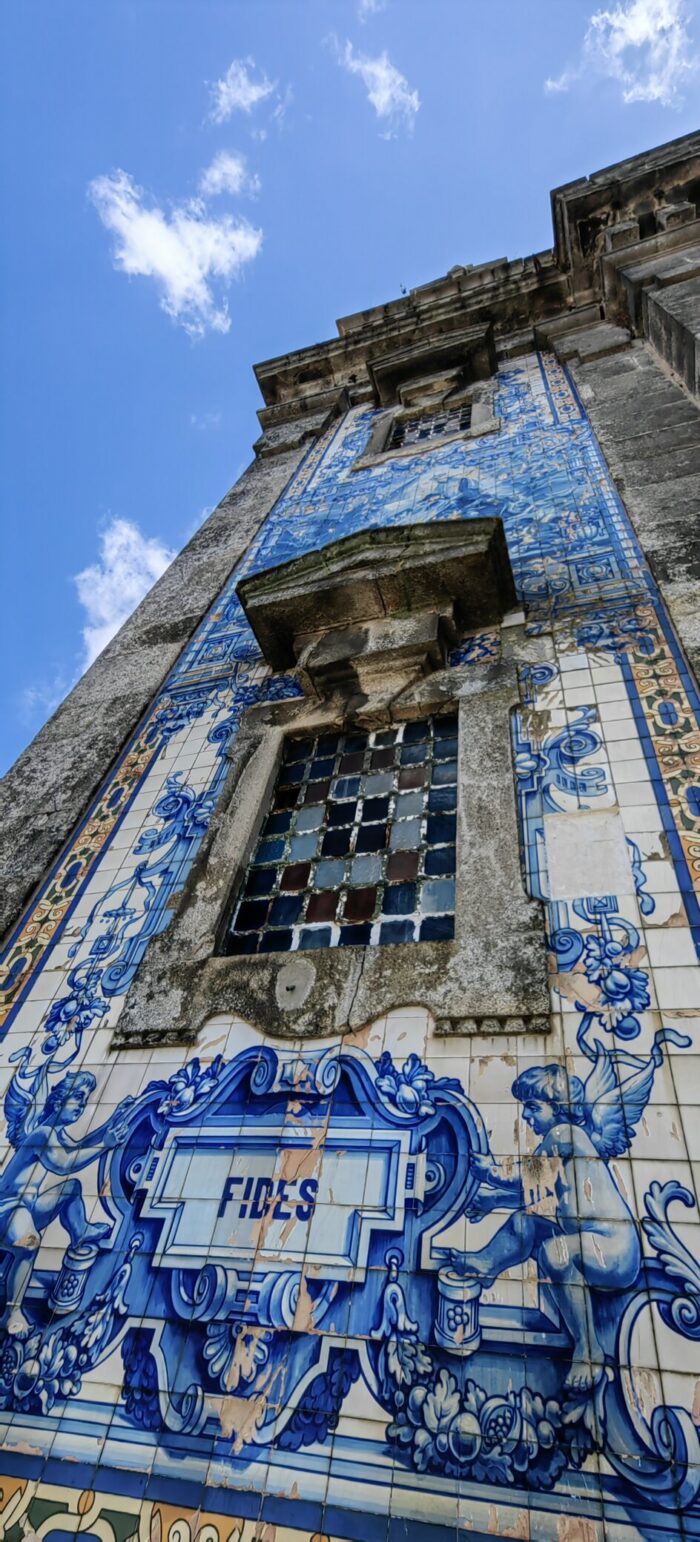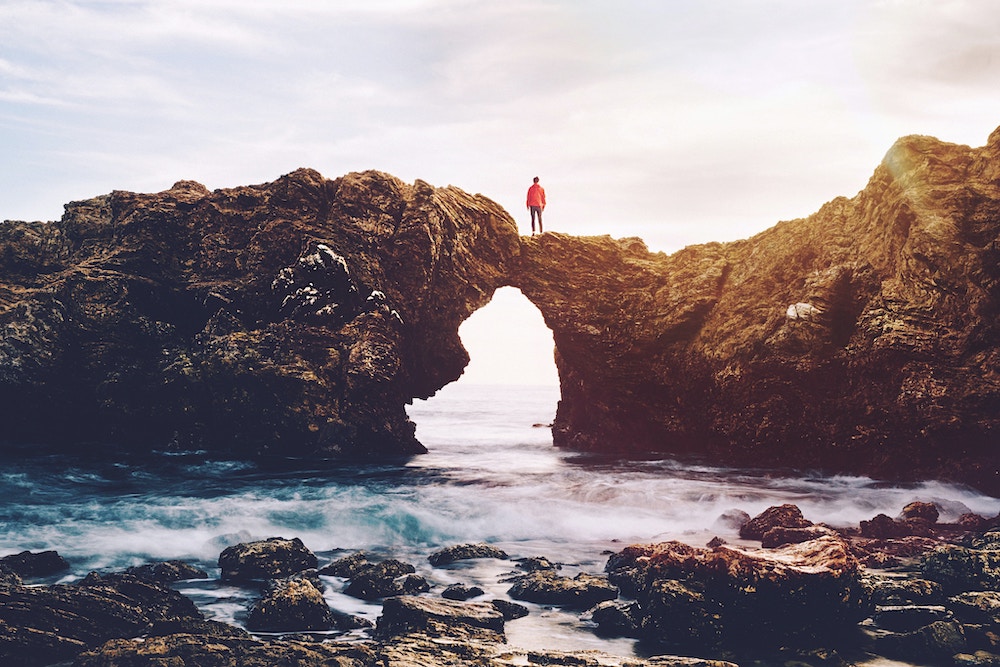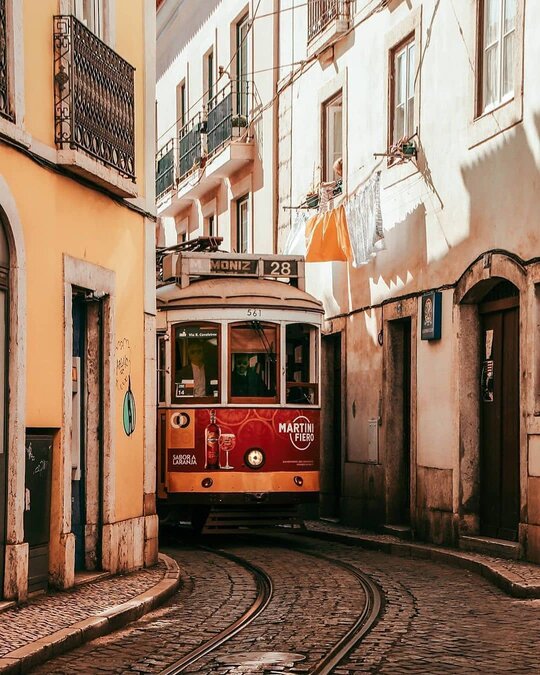As an ambitious journalism student, one of my post-university visions was to work as a travel writer. So when the opportunity of completing my last semester remotely due to the pandemic presented itself, I didn’t think twice. Adventure called, and I answered.
I arrived in Marrakesh, Morocco, in early January, and set to work on my dissertation, investigating the rise of sustainable tourism in the country. My aim was to spend three months building a portfolio of work, while simultaneously testing the waters of a digitally nomadic lifestyle. Starting out I felt brave, strong, and confident. The world was at my feet and I was ready to trek.
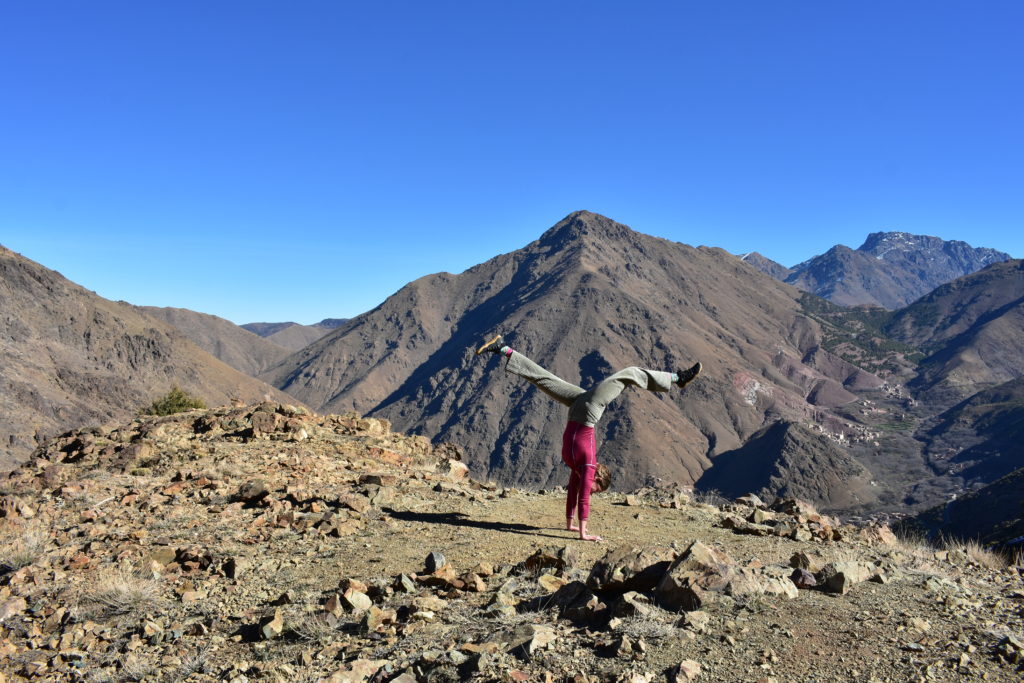
What better way to experience Morocco’s High Atlas Mountains than upside down?
Fast-forward three months and my can-do attitude had lost steam. I felt homesick and conflicted. Balancing work with resting, while dealing with all that solo-traveling entails was hard. I had always dreamed of a life on the road spent writing copy in a cafe. So why did it feel so off?
In one acronym; FOMO, Fear of Missing Out. The inevitable, inconvenient, and irreversible component of leaving one place for another is that you are no longer there. But everyone you know—everything you know—is, and having to deal with the jealousy that this knowledge can cause, is the harsh reality of a life spent on the road.
In exchange, you will create deep bonds with like-minded travelers. You will visit places beyond your wildest dreams, and experience the ecstasy only an escapade in a foreign place, among newly-found friends can produce. But, again, it comes at a cost. And these two forces of cost and reward, are in a constant battle for attention.
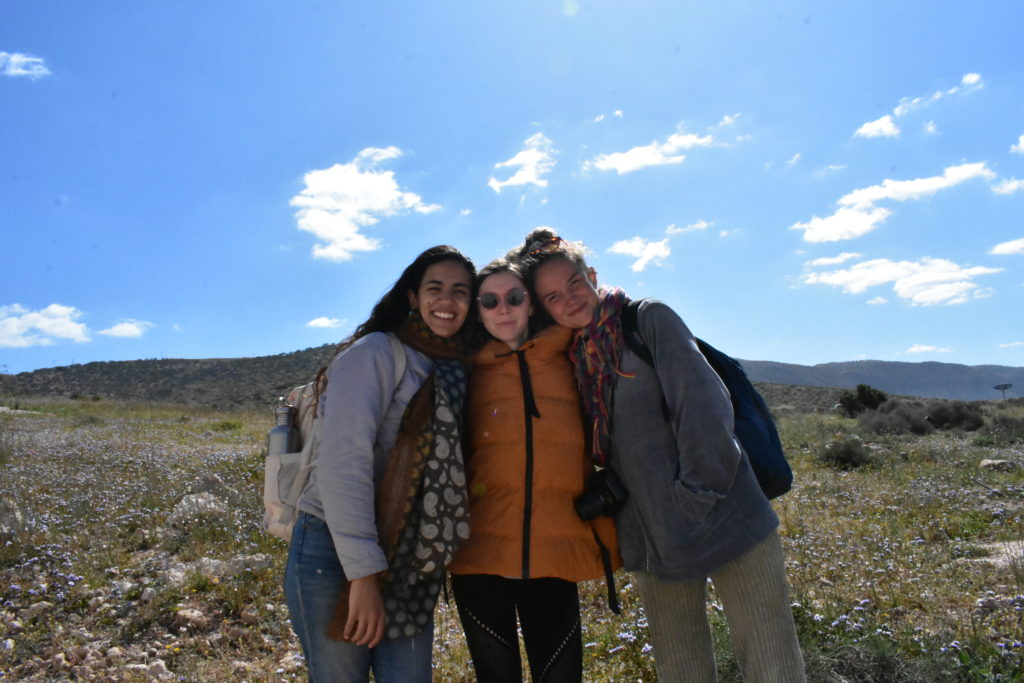
I made some amazing friends throughout my journey—here I’m enjoying the company of my friends Yasmina, and Coco.
For much of the time I spent in Morocco, my attention was drawn to the costs which came to overshadow many of the rewards I got to enjoy. Yet stubborn as I am, I refused to admit to myself that I was struggling. I plowed on. I didn’t want to reconcile with the idea that being a travel writer was not the glossy experience I’d imagined it to be. I actively pushed such thoughts aside. But they kept rising to the surface; suppressed feelings find ways to bursts through the thickest of walls.
When the time arrived to write my last-ever article for my University’s student newspaper, Brig News, I was internally dying to share my experience with others. But instead of doing so (since that would entail admitting to myself that I was struggling), I decided to interview a travel writer with years of experience within the field, to portray life on the road. That way, I could tell a success story, a story of someone who had, contrary to myself, figured out the key to leading a carefree life on the move—or so I thought.
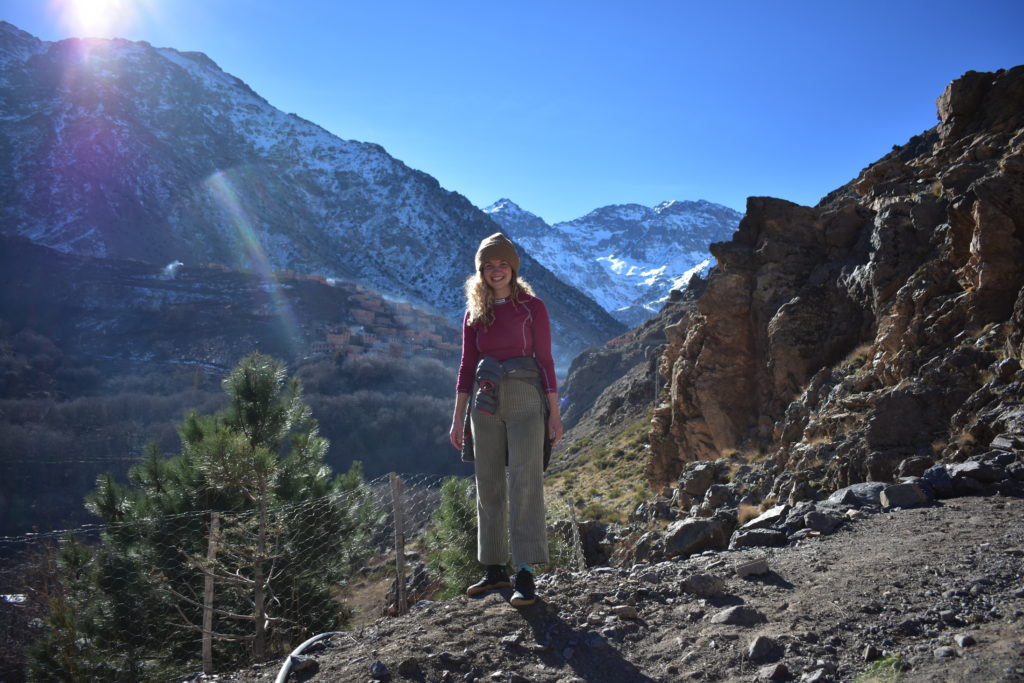
Whenever I feel lost or confused during a trip, heading out into nature always helps to make me feel grounded and connected.
A life spent traveling inevitably comes with more potholes than one spent in the safety of a stable home—something freelance journalist, and writer Derek Workman can attest to. The British expat—who has written for Smithsonian Magazine, among others—found himself stuck in Turkey, without a place to live and no means to exit the country due to COVID, as we (e)met and discussed the ups and downs of life as a travel writer.
When preparing for this interview I already had an unconscious narrative attached to his story. I imagined telling the inspirational story of a man conquering the world, word-by-word. A heroic story, where his drive to explore and experience the thrill of life on the road beat any sensible bursts of doubt.
As a journalist, I was aware of the flaws a framed mindset brought to the table. Not only does it inhibit the ability to properly listen, but it also goes against the very core of journalism: to act as a transmitter of stories, not as an inventor of them. Letting stories unfold organically is part of the job. Minimal adjustment, minimal subjectivity—at the very least, no altering of messages conveyed by your sources. As an individual, however, I craved hearing a success story.
Derek, a forthright man in his 70s, had other plans—to share the honest truth:
“I didn’t actually start writing until I was 50 when I went to Spain,” he said, explaining that he left his home in Manchester, England, “on the cusp of the millennium,” in search of adventure.
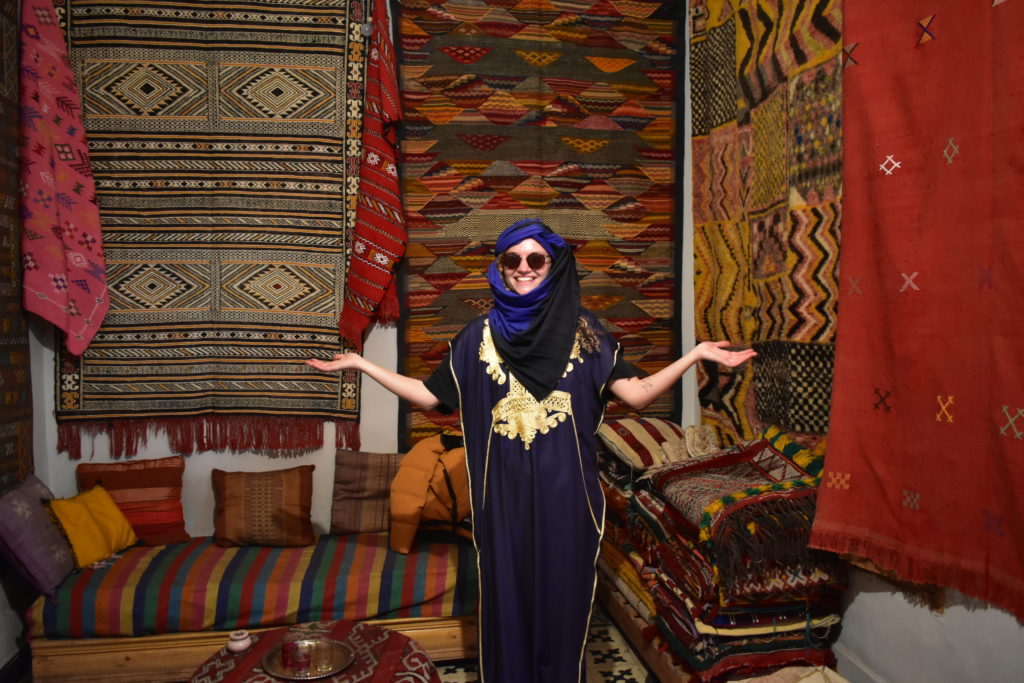
During my time spent in Marrakech, I got to experience life as a local living in the old Medina—here I’m trying to properly blend in.
Upon arrival, Derek got to know some people working at Costa Blanca News, Spain’s largest English-language newspaper group at the time, and soon found himself doing the same. His first—and certainly not his last—travel-writing-gig was underway.
“I arrived in Spain with the equivalent of £300, a bag of second-hand clothes…an old computer and just went on from there. You could do that then; I wouldn’t like to try it now,” he said with a slight grin.
Hoping to break the stereotypes around travel writing, Derek opened up about the hardships of the occupation. He described the loneliness, the boredom, the round-the-clock working hours, and the constant uncertainty that comes with freelancing work.
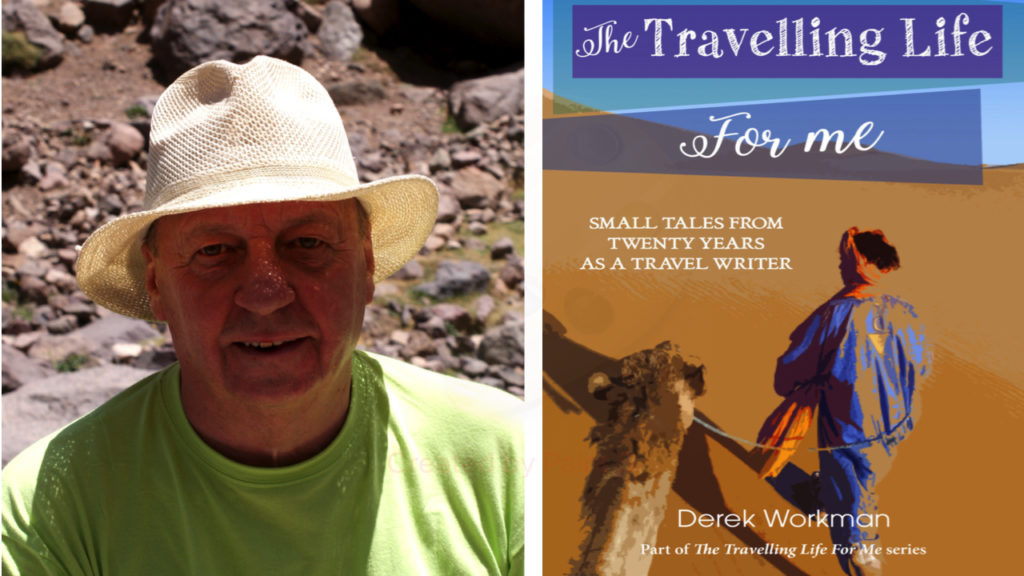
Derek Workman has written several books on the topic of travel-writing – you can find much of his work online.
But despite all the downsides, he was content with his latest line of work. It has provided him with experiences others only dream of—and they were often provided to him for free. It has given him the opportunity to spend the night in a Spanish five-star palace, sample the menus of ludicrously luxurious restaurants, and buddy up with camels on a fully-subsidized trip around Morocco.
The greater part of his life in Spain was spent in Valencia, where he spent fifteen years writing about the city and the Valencian region, as well as covering much of Spain. Eventually, his longing for new cultures saw him hop across the globe, with “a case of 25k and my bike,” to live in the third-largest city in Thailand: Chiang Mai.
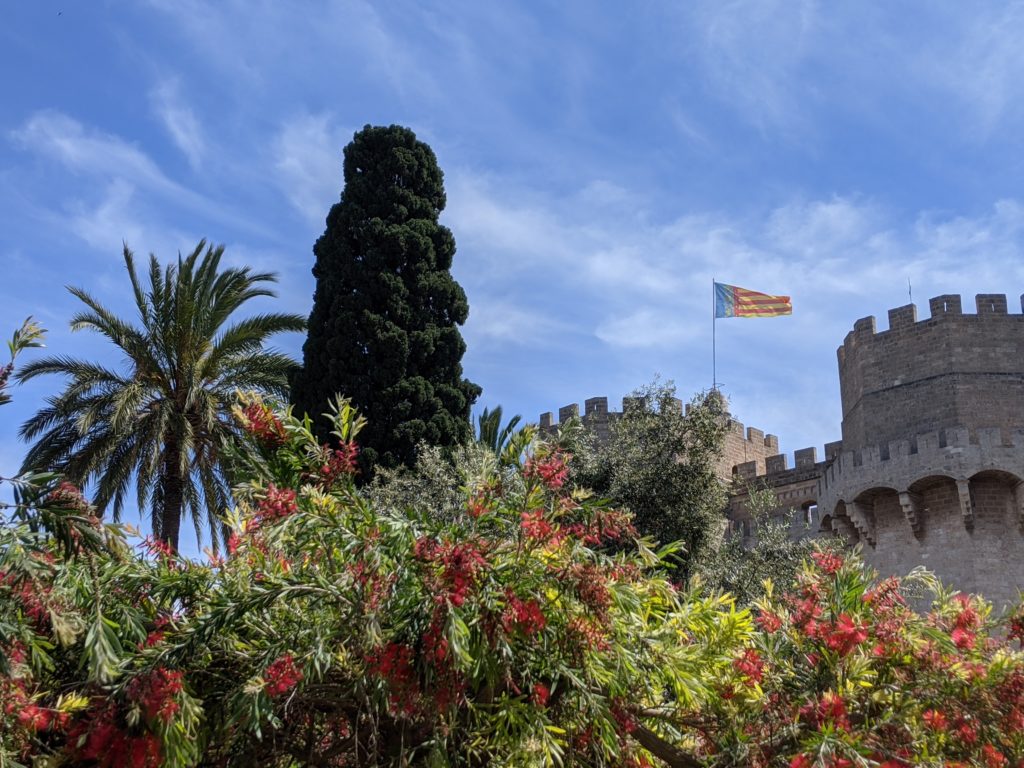
Valencia is full of green spaces where you can take a siesta whilst enjoying your beautiful surroundings – here’s the view of the Quart Towers from a nearby park.
He loved the bustling Southeast Asian city, famous for its rich culture and fantastic food scene. But six years in he felt he’d seen enough temples; the constant heat and the air pollution were getting to him. In the midst of the pandemic, he thus found himself moving to Turkey: the country of baklava and rugs (and much, much more).
“Antalya is now my home, which I intend to use as a base while I look at Turkey and, hopefully, go further afield in Europe over the next years.” These days he considers himself a writer about travels, rather than a travel writer, and never a digital nomad.
“I was a digital nomad long before the name was invented because I also worked while I was traveling, whether it was for a few days or a couple of weeks, but I always had a home to go back to, just as do 99% of professional travel writers do.”
‘Maybe that’s where I’d gone wrong?’ I thought to myself, as our conversation was moving into practical advice. Was it as simple as that? Was it my lack of a substantial home I could return to that caused this unshakable feeling of being lost? In Derek’s eyes, the definition of home seemed so obvious, so static, yet in mine, it was an abstract, emotional phenomenon.
As for the practical stuff, a major tip to anyone considering a career within travel writing is to stay organized; with photos, documents, interviews, and recordings. That is your lifeblood, and you must protect it accordingly, Derek explained. But a willingness to put in the extra hours, and to create a trusting relationship with editors should be your absolute highest priority.
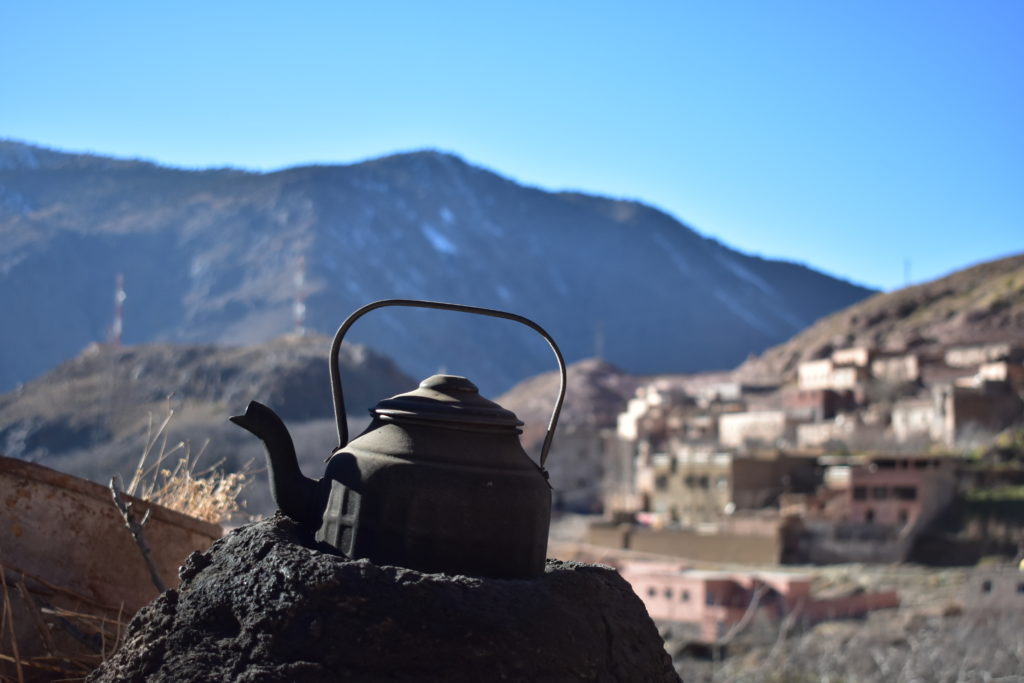
In Morocco, there is always time for tea – even when on a hike in the mountains.
Some other vital practices that are simple and often overlooked: investigate and network.
“Wherever you are, step onto the street, and just start walking.” By observing, exploring, and speaking to the people around you, the stories that make that place unique will make themselves known. Secondly, Derek emphasized the importance of building as wide a network as possible. That’s how you land many of the gigs within this unpredictable field.
Essentially, Derek concluded that being a travel writer is no glamorous pastime. It takes over your life, what with the odd hours, days and weeks spent on the road. There is always a level of uncertainty about it, due to all the external circumstances involved. It’s full of dull moments and waiting; in queues, in train stations, at airports. But despite that, he’d not want to swap it for the world: “It’s brought me experiences I never even dreamed of having.”

The morning skies in Ourika Valley, at the foot of the High Atlas Mountains, are an endless source of beauty.
The article I produced for my student newspaper following this interview turned into stardust and never made any official appearance anywhere. Because although I didn’t realize it at the time, I was projecting my wishful thinking onto Derek’s experience. This became apparent when Derek sent me this unvarnished feedback via text:
“The way you have written it feels as if you have told your story of my travel writing life and not mine… Unfortunately, it reads like the advertising for a company selling programs on how to be a travel writer and not genuine information from a long-time writer about the pitfalls and pleasures of the job.”
And he was right. I had twisted his words to obtain somewhat of a listicle-type structure, logging the ‘dos’ and ‘don’ts’ of the occupation in a sloppy attempt to organize my own thoughts. Did the positives really outweigh the negatives for a travel writer? I was unsure.
The lack of a steady social network had me feeling lonely. The constant moving had ruptured any form of healthy routine I’d previously had going on. I had no substantial form of income, and all my pitches to various publications were unsuccessful. I felt stressed, lost, and rootless.
Yet, the unbelievably beautiful places I’d visited; the wonderful people I’d made friends with along the way, and the magical moments of true bliss, sparked by the feeling of freedom only life on the road can produce, meant that, in the end, I would do it all over again. And I guess that’s what Derek was trying to get at. That despite the inevitable hardships you will encounter as a travel writer, the thrill of the unknown outweighs the terror of it.
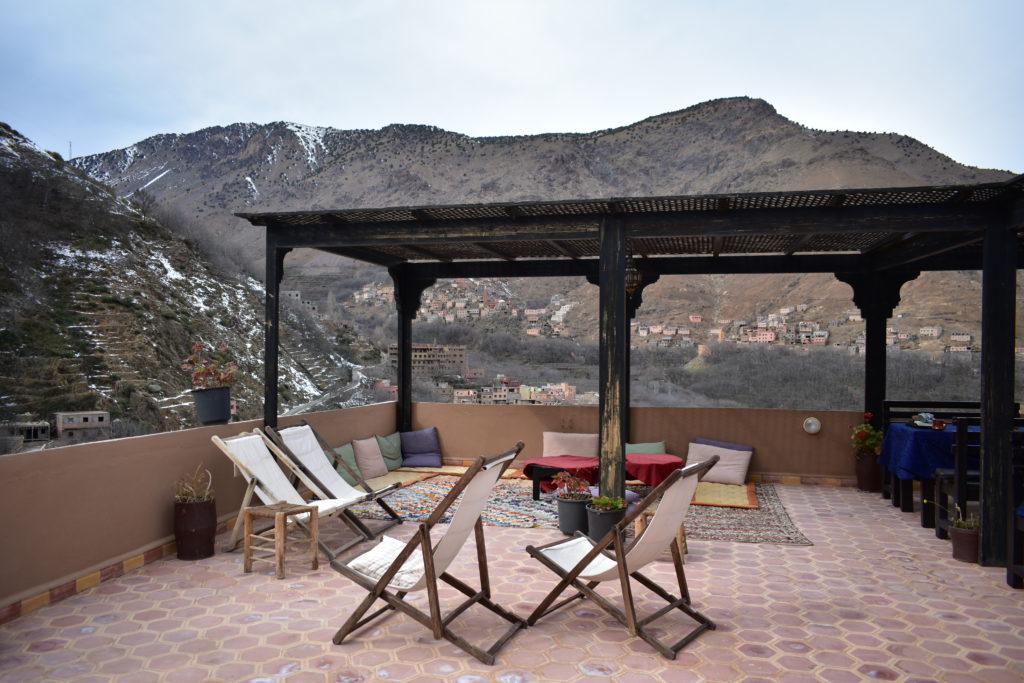
If you don’t feel up for hiking, the best way to enjoy the views in Imlil is from one of the many rooftop patios in the village.
Being a travel writer is by no means a safe or stable job. You will have to take risks and you will face struggles along the way. But simultaneously, it could see you get paid to ride 4x4s through the Moroccan desert, and become neighbors with the elephants of north Thailand, as Derek did.
Being a travel writer means being thrown between extremes, and in following such a career, your main pursuit will be finding a balance between them.
Also by Aine: As An Adventurer By Nature, Yoga Is The Only “Home” I Can Count On
Get more like this—Sign up for our daily inspirational newsletter for exclusive content!
__
Photo: Aine Donnellan


